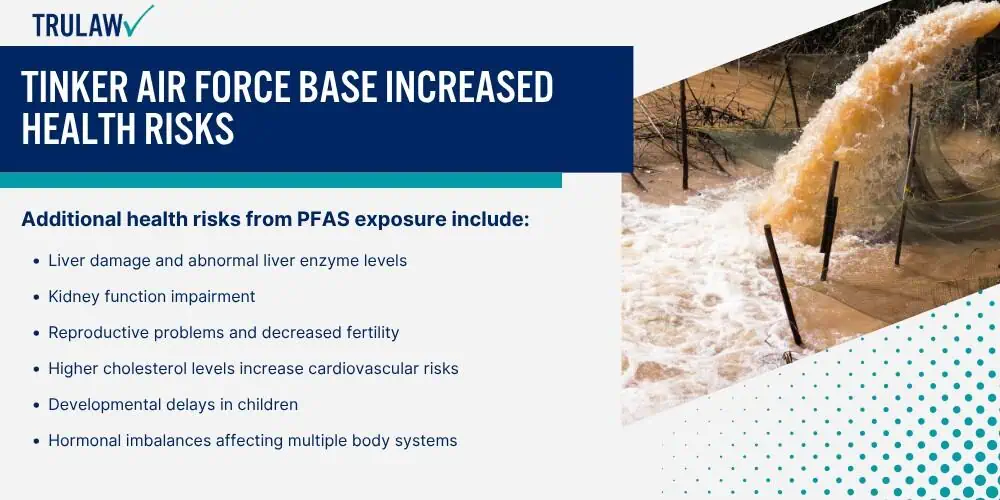Tinker Air Force Base in Oklahoma City has become a focal point for concerns about toxic PFAS chemicals in drinking water and groundwater.
Testing has revealed alarmingly high concentrations of these hazardous substances, with PFOA levels measured at 4,625 times higher than the EPA’s threshold and PFOS levels 65,000 times higher than the standard.

These findings have prompted investigations by the Department of Defense and legal action by affected individuals, including military personnel and their family members.
The base ranks 52nd on the Environmental Working Group’s list of top 100 most polluted U.S. military bases, with an onsite PFAS concentration of 170,000 parts per trillion according to testing done in 2017.
This level of contamination poses substantial dangers to military personnel, their families, and nearby communities who may have consumed the water without knowledge of its toxicity.
Adverse Health Effects Linked to PFAS Exposure
The PFAS chemicals found at Tinker Air Force Base have been associated with numerous harmful health outcomes that can develop years after exposure, often documented in medical records.
Research continues to uncover connections between these “forever chemicals” and serious medical conditions.
PFAS exposure has been linked to several forms of cancer, thyroid disease, immune system suppression, and developmental issues in children.
The chemicals persist in the human body for years after exposure, gradually accumulating and potentially causing long-term damage to organs and biological systems.
A recent study reported associations between PFAS exposure and increased rates of thyroid cancer, particularly papillary thyroid cancer, with strong biological plausibility for this connection.
Thyroid function disruption represents one of the most documented health effects.
PFAS are believed to be endocrine disruptors that interfere with the thyroid hormone system, with prolonged exposure linked to both hyperthyroidism and hypothyroidism.
This disruption can lead to numerous symptoms including fatigue, weight changes, and mood disturbances.
Additional health risks from PFAS exposure include:
- Liver damage and abnormal liver enzyme levels
- Kidney function impairment
- Reproductive problems and decreased fertility
- Higher cholesterol levels increase cardiovascular risks
- Developmental delays in children
- Hormonal imbalances affecting multiple body systems
According to experts, the severity of health effects depends on exposure levels, with higher amounts potentially causing more acute problems.
The dangers primarily come from ingesting contaminated water, though contact exposure and inhaling contaminated water vapor can also contribute to overall exposure.
Increased Health Issues Among Tinker Air Force Personnel
Personnel who lived or worked at Tinker Air Force Base face heightened risks of developing PFAS-related conditions due to their proximity to the contamination source and duration of potential exposure.
Military members stationed at Tinker Air Force Base may have experienced constant exposure to AFFF (firefighting foam) and contaminated water supplies, leading to severe health conditions in both service members and civilians.
The greatest concern exists for those who spent extended periods at the base, particularly during training exercises or long-term assignments that would have increased their cumulative exposure.
Veterans who served at Tinker should watch for potential symptoms of PFAS-related conditions, including:
- Unexplained fatigue or weakness
- Changes in weight not related to diet or exercise
- Swelling in the neck area
- Unusual lumps or growths
- Persistent digestive issues
- Frequent infections or slow healing
- Memory or cognitive problems
The PFAS Action Act was introduced to address these concerns, establishing monitoring standards for PFAS in drinking water and funding studies on health risks, with proponents stating that access to clean drinking water is “a basic right.”
For those who lived or worked at Tinker Air Force Base and now experience health problems, legal options exist to seek compensation for medical expenses and other damages.
Individuals who can demonstrate exposure to contaminated water and resulting adverse effects may qualify for legal action, particularly if they have incurred significant medical expenses or suffered financial losses due to PFAS-related health conditions.
Working with an attorney experienced in military contamination cases offers the best path toward potential compensation.
U.S. Military Base Water Contamination: Nationwide PFAS Exposure
PFAS contamination extends well beyond Eaker Air Force Base, affecting hundreds of military installations across the United States.
The widespread use of AFFF firefighting foam has created a national contamination crisis at bases operated by all branches of the armed forces.
Additional military installations that contain PFAS contamination include, but are not limited to:
- England Air Force Base
- Naval Air Station Jacksonville
- Air National Guard Base
- Warren Air Force Base
- Sawyer Air Force Base
- Rock Air Force Base
- Altus Air Force Base
- Ellsworth Air Force Base
- Holloman Air Force Base
- Cannon Air Force Base
- Wurtsmith Air Force Base
- Vandenberg Air Force Base
- Grand Prairie Armed Forces
- Horsham Air Guard Station
- Tyndall Air Force Base
Testing at these facilities has revealed PFAS levels that frequently exceed safety standards by significant margins.
The Department of Defense faces growing pressure to expedite cleanup efforts, provide alternative water sources for affected communities, and take responsibility for decades of contamination.
Coordinated remediation plans now represent one of the largest environmental cleanup challenges in U.S. military history.





